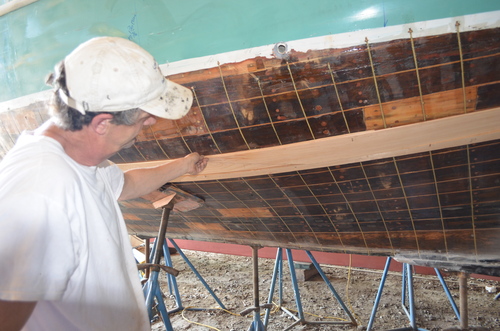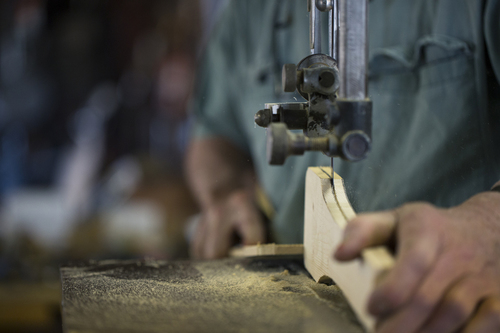


The advantages of the Cutts Method far outweigh traditional methods of building boats. No longer are there problems with insufficient strength, breaking of ribs, seam caulking/leaking, butt blocks and electrolysis, to mention a few.
Superior Penetration and Gripping Strength
Because of the low surface tension of epoxy resins in the liquid state and the absorbing thirst
quality of dry end grain lumber, the resin is pulled by capillary attraction into the end-grain of
the wood, producing deep penetration that provides a mechanical bond to the lumber rather than mere
surface adhesion. The super-high tenacity of the cord, so fixed, provides enormous strength
reliability even in softer woods.


Easy Repair The hull is an inert structure just as the fiberglass boat is inert. If damaged, by accident, a built in collision mat is already in place and repairs are simple to make by cutting to the cord on each side of the fracture, and graving in a feathered inner piece, installing elongated cord loops, and feathering in a piece of outer planking.
Superior Transverse Strength
The transverse strength of the hull can be exceedingly high. The Kevlar is, besides being unaffected
by corrosion, many times the strength of steel. Material costs are less than other methods and the
savings in weight is a great design advantage. The hygroscopic nature of wood automatically
pre-stresses the cords upon immersion in water. Wood is much stronger in the dry condition than when
wet. The waterproof epoxy barrier between two planks preserves the dryness of the inner layer, and
therefore retains the fullest strength possible. Moreover, the cords are installed in a way that
keeps the hull planking system keyed together, eliminating longitudinal working of seam edges.
Superior Longitudinal Strength
The double planking, because it is layered in the lengthwise direction only, can develop the full
longitudinal strength required of the hull tube rather than laying half the planking across the boat
diagonally as in cold molding. Because the planking may be planed and sanded smooth without fear of
cutting through paper thin layers of veneer, absolutely no fabric overlay is required.
Elimination of Electrolysis
With the Cutts Method the cord is completely sealed in epoxy inside the planking so the former
electrolysis problems caused by metallic fasteners in surface contacts is eliminated. The hull is an
inert structure just as the fiberglass boat is inert. The life of the Kevlar cords can be measured
in hundreds, even thousands of years, because of its nonbiodegradable nature. The outer surface of
the planking is no longer perforated with screw holes
Elimination of Leaky Butt Blocks and Seams
The Cutts Method has produced a superior method of joining planks for repair work, eliminating the
traditional “Butt Block” and all the costly problems associated with the deterioration of them over
time. Additionally, all boats constructed using the Cutts Method produce seamless hulls inside and
out. The Cutts Method uses a unique method of filling seams that penetrates and bonds into the wood
producing a perfectly smooth hull that eliminates all caulking.
Lighter/Faster/Cleaner/Less Expensive
The Cutts Method will unequivocally produce a lighter, faster, cleaner and less expensive boat than
construction using the traditional methods of boat building. The elimination of bulky, heavy oak
framing, unnecessary metals and fastenings produce a much more responsive craft. Smooth surfaces
(inside and out) give you a clean uncluttered structure. Total construction and labor costs are
greatly reduced through the elimination of unnecessary construction procedures and materials.
All the Room of a Fiberglass Hull
With the elimination of bulky ribs, or framing, the Cutts Method produces a boat with as much (if
not more) room than a fiberglass boat of comparable size and design. Furthermore, strategically
placed structural bulkheads and structural built-in cabinetry help to produce an open, airy and
spacious interior.


